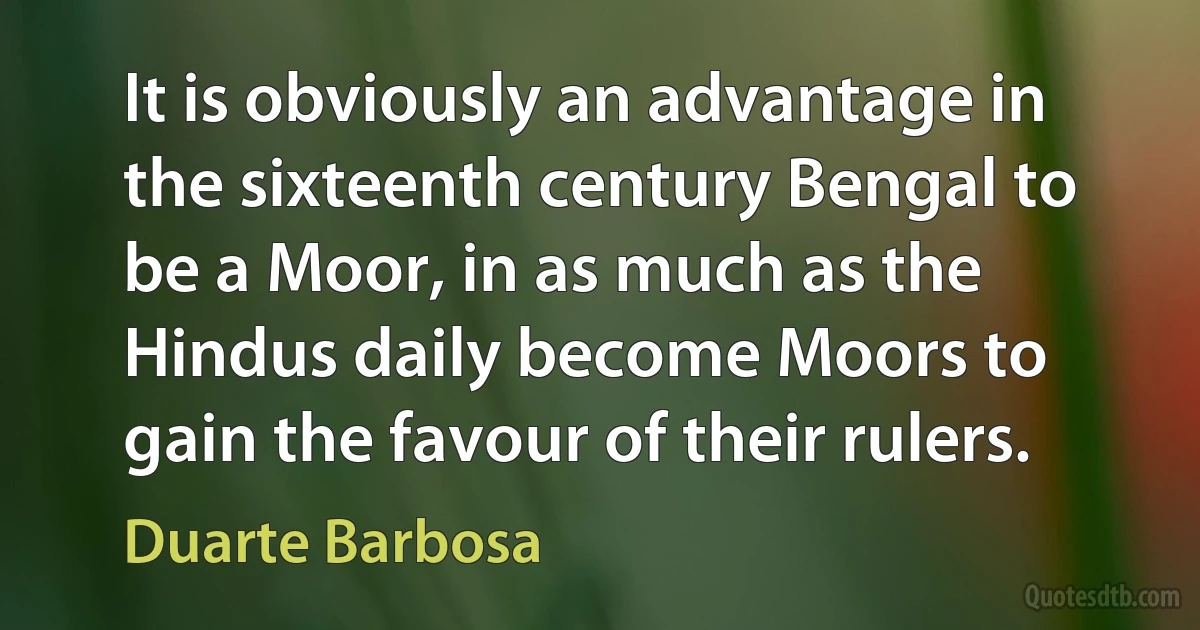Bengal Quotes - page 2
The enthusiastic soldiers, who, in the thirteenth and fourteenth centuries, spread the faith of Islam among the timid race of Bengal, made forcible conversions by the sword, and, penetrating the dense forests of the Eastern frontier, planted the crescent in the villages of Sylhet. Tradition still preserves the names of Adam Shahid, Shah Halal Mujarrad, and Karmfarma Sahib, as three of the most successful of these enthusiasts.

Duarte Barbosa
In Hindustan, especially in the province of Sylhet, which is a dependency of Bengal, it was the custom for the people of those parts to make eunuchs of some of their sons and give them to the governor in place of revenue (mal-wajibi)... This custom by degrees has been adopted in other provinces and every year some children are thus ruined and cut off from procreation. This practice has become common.

Jahangir
Under Muhammad Tughlaq, wars and rebellions knew no end. Even an enhancement of land-tax ended in massacres in the Doab. Many more perished on the way when the capital was shifted to Daulatabad. His Qarachal expedition cost him a whole army. His expeditions to Bengal, Sind and the Deccan, as well as ruthless suppression of twenty-two rebellions, meant only depopulation.15 From all accounts it is certain that in the thirteenth and first half of the fourteenth century the loss of population was immense.

Muhammad bin Tughluq
Tulsidasa alone, though the most famous of them all, has no disciples that are called after his name. There are Vallabhachars and Radha Vallabhs and Maluk Dasis, Pran Nathis and so on in interminable succession, but there are no Tulsidasis. Virtually, however, the whole of Vaishnava Hinduism has fallen under his sway; for the principles that he expounded have permeated every sect and explicitly or implicitly now form the nucleus of the popular faith as it prevails throughout the whole of the Bengal Presidency from Hardwar to Calcutta.

Tulsidas
It's the religious aspects in which I feel most at home, in a way. No, I don't really feel at home in India anymore. I'm not physically comfortable in India most of the time-I like Chicago, I like snow. It's an irony that I should be an Indologist because I don't like hot climates. I don't like crowds. There are too many things about India that don't suit my physical makeup. And also, I hardly ever go to Bengal, so I don't have a language[ to speak. So I go as a visitor. I visit friends. To some extent, ironically, I'm more at home in India now because there are fabulous hotels with good food and people speaking English, it's like being in New York, but if I go to a village I can't talk to people. I don't know if I ever really was at home in India, but I love being there.

Wendy Doniger
The Hindus' sense of gratitude knows no bounds to Muslim rulers like Zayn al-‘Abidin (1420-70) of Kashmir, ‘Alau d-Din Husayn Shah (1493-1519) of Bengal, and Akbar the Great Mughal, who behaved towards Indians as Indians and at whose hands they could heave a sigh of relief from religious persecution. The three rulers tried their utmost to Indianize their rule and restore the dignity of Hindu community and culture, the latter essaying the uphill task of integrating Islam therewith, followed in this behalf by Prince Dara Shukoh. Who that has even the faintest sense of history can dispute the point that they were all intensely Indian, putting many a Hindu to shame in their patriotic fervour.

Alauddin Husain Shah
The Hindus' sense of gratitude knows no bounds to Muslim rulers like Zayn al-‘Abidin (1420-70) of Kashmir, ‘Alau d-Din Husayn Shah (1493-1519) of Bengal, and Akbar the Great Mughal, who behaved towards Indians as Indians and at whose hands they could heave a sigh of relief from religious persecution. The three rulers tried their utmost to Indianize their rule and restore the dignity of Hindu community and culture, the latter essaying the uphill task of integrating Islam therewith, followed in this behalf by Prince Dara Shukoh. Who that has even the faintest sense of history can dispute the point that they were all intensely Indian, putting many a Hindu to shame in their patriotic fervour.

Dara Shukoh
Everybody knows him as the founder of the Indian Statistical Institute, the architect of the Second Five Year Plan, a close associate of Rabindranath Tagore and as one who had richly contributed to the social, cultural and intellectual life in Bengal. All those in the statistical profession were aware of his deep contributions to statistical theory, his efforts in providing a sound database to the Indian economy, and the part he played in placing India not far from the centre of the statistical map of the world. Those who have been closely associated with him have witnessed the indomitable courage and tenacity in fighting opposition for a good cause and clearing obstacles for propagating right principles.

Prasanta Chandra Mahalanobis
H.W. Nevison of The Manchester Guardian recorded that in 1907 in East Bengal "priestly Mullahs went through the country preaching the revival of Islam and proclaiming to the villagers that the British Government was on the Mohammedan side, that the Law Courts had been specially suspended for three months and no penalty would be exacted for violence done to the Hindus, or for the loot of Hindu shops or the abduction of Hindu widows. A Red Pamphlet was everywhere circulated maintaining the same wild doctrine... In Comilla, Jamalpur and a few other places, rather serious riots occurred. A few lives were lost, temples desecrated, images broken, shops plundered, and many widows carried off. Some of the towns were deserted, the Hindu population took refuge in any pukka houses, women spent nights hidden in tanks, the crime known as ‘group-rape' increased and throughout the country districts, there reigned a general terror, which still prevailed at the time of my visit.”.

Sita Ram Goel
Kerala has given a lead in carving out Muslim majority districts, leaving the local Hindu population at the mercy of Mullahs and Muslim hooligans. Bengal under anti-national Communists and U.P. under a crumbling Congress edifice are most likely to walk into this Islamic trap before long. Several enquiry commissions or their reports have been suppressed because the verdict was likely to go or had gone against the Muslims in fixing the responsibility for riots.

Sita Ram Goel
Chittaranjan Das: I believe that Bengal has a message for the world. Keshub Chunder Sen delivered that message. Again and again that message has been delivered on the banks of the Ganges, and again and again will that message be delivered and redelivered in a fuller and yet fuller manner till we listen, till the world listens.

Keshub Chunder Sen
Therefore, the Hindus and Sikhs, the minorities in the new Muslim homeland, were not to be suffered to stay there. This "minorityism”, the name for Hindus and Sikhs, was "the major enemy of the Milltat,” as Rehmat Ali, one of the early League leaders and intellectuals and coiner of the word Pakistan, said. According to its original conception, Pakistan itself was to be larger than it turned out to be; it was to include Kashmir, Assam and Bengal in the East and Hyderabad and Malabar in the South and many independent Muslim states within the rest of the Indian territory. India, or whatever remained of India, was itself to be considered Dinia, an important Islamic concept.

Ram Swarup



